Trevor Horn talks to SDE about his new album
“Invented the sound of the 80s? Bollocks.”
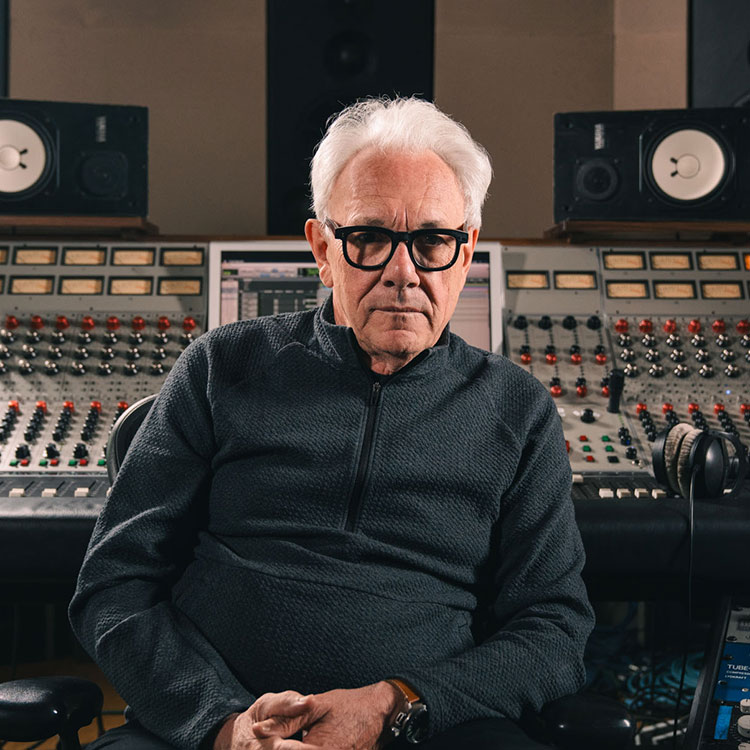
Trevor Horn’s new album Echoes – Ancient and Modern was released last week. As well as issuing an exclusive blu-ray audio edition of the album, SDE caught up with Trevor recently at his North London home to discuss the record and his experience working with the various guest vocalists who appear on it.
SDE: There’s this quote, isn’t there, about how you are the man “who invented the sound of the 80s”? What do you think people mean, when they say that? Are you pleased when you hear it?
Trevor Horn: I wasn’t pleased when I first heard it, because I thought it was bollocks. But it’s like anything, the more you hear it you just go… [dismissively] yeah, sure, okay. I was just a person that made some records first. I suppose I was ahead of everybody at the time. Only for a few years, for about three years. And then they brought out the AKAI S900 Sampler. And that, was it, more or less.
How would you define your sound and your production style? Has it changed over the years? I think if you asked the average music fan, they’d probably say you had a certain level of perfectionism. Is that still true?
I was only ever a perfectionist about the emotional impact of the record. That’s what I was mainly interested in. When I first started making records in the mid-70s, most of the people who were successful were monolithic, like Queen… How do you compete with a record like ‘Bohemian Rhapsody’? I mean, that’s so far ahead of what anybody’s ever really been able to do. No one’s made [a] ‘Bohemian Rhapsody’ since then. Not even close. But towards the end of the 70s, I had this feeling that the whole next thing with music was techno [technology-driven]. Just listen to The Man-Machine [Kraftwerk’s 1978 album] and stuff like The Normal [the name Daniel Miller recorded under in the late 70s]. I could just feel there was a revolution coming, and I was working in studios all the time, doing demos for people. I watched keyboards go from being a minimoog or a Fender Rhodes to suddenly being a polymoog. Those kind of changes were earth shattering. By the time the 80s started, I’d had a hit record [‘Video Killed The Radio Star’] and it was a huge, huge, hit. So I was uniquely qualified to make records – I understood what we had, and what was coming. And I couldn’t wait to get my hands on it.
One of the reasons people employed you, in the 80s, was probably because they thought you had the Midas touch and you could give them a hit. But the days of worrying about radio and hits and whether it’s ‘commercial’ or not have rather disappeared…
It’s not the same [anymore]. Back then you had a very narrow window and you had to have something that would get on Top of the Pops, get on the radio. And if you didn’t make it to Top of the Pops, or it didn’t make it on the radio, it wouldn’t sell. There was no other way of doing it. But now people have done it in different ways without really having a hit single. But even having said that, Pulp never really rose much above the parapet, until ‘Common People’. Everybody needs a hit single.
But that isn’t really open to you now, because it doesn’t matter how good this record is or how good the songs are, you aren’t likely to have a hit single from it.
Yeah, I know.
Does that depress you, a bit?
Yes, it does. But I’ve got to a point where I just hope people listen to it, basically. That’s all you can hope for.
So where did the title come from, ‘Echoes – Ancient and Modern’?
I wanted to call it Ancient and Modern. Echoes, I suppose, was the idea that it’s these fragments from the past. It feels like that to me. Although most of the songs are from the 80s, not all of them are.
What’s the art of a great cover version? Because lots of people say the worst thing you can do is try and replicate the original, which seems like a fair point. Was that in the back of your mind when you’re approaching all these?
Yeah, it was. Occasionally it could be quite irksome, because the way I would like to have done the song was the way it was originally done. But I can’t do it that way…
Especially when you’ve done it yourself!
Yeah, in some ways, those songs are easier because, I’ve played ‘Slave to the Rhythm’ and ‘Relax’ loads of times so I know the DNA of those tracks.
When you write a new song, the excitement comes from the fact that you’re creating something from scratch. But when the song already exists, is it harder to get inspired and find a way in?
It can be, but also quite often you’re dealing with a better song. Because you’ve chosen to take it on.
People will look at this and think, it’s a follow up to Trevor Horn Reimagines the Eighties, which you did a few years ago, but obviously, that was very orchestral, whereas this is less so. There are a lot of super smooth synths on this record. Was that something you really wanted to embrace?
Yeah, I’ve really gone back to liking the sound of synths, again. I’m sick of orchestras. Because I did that with the Rod Stewart record, as well. So I’m orchestra’d out – I don’t want to do that again.
A lot of bands, just for some product, they’re going back and just doing an orchestral album. It’s become the big thing.
Yeah, well, I think it’s probably on the wane again. But it’s like, you have all these record labels sitting on all this product and every few years, they figure out some way of flogging it again. Of course, you will never have quite what we had back in the 80s, when vinyl was replaced by CDs and suddenly, the record labels had more money than they knew what to do with. I still like CDs. One of the things that stopped me from changing my 10-year old car is because it’s got a CD player in it. And I’m just worried the next one won’t have a CD with it and I’ll be forced to play music from my phone. And it won’t sound the same. It’ll be a bullshit streaming services, which isn’t bad, but when you listen to it on proper speakers, it’s not great.
I still like CDs. One of the things that stopped me from changing my 10-year old car is because it’s got a CD player in it
Trevor Horn
I still really like CDs too, but a lot of people feel like the mastering on CDs has got worse over the years with mastering engineers limiting the sound and losing the dynamic range.
Yeah, I hate it. I just remastered Seal’s first album. That’s an album that’s very dear to my heart. It’s one of the best records I made. It’s kind of rough around the edges here and there, but it’s got so much life in it. And when I heard the new mastered version of the tracks I loathed them. I went out and dug out a 1991 copy of the album that I had in a cupboard that hadn’t been played for a long time and in fact, hadn’t been played much at all. I transferred it into Pro Tools, at 96k, and the difference in quality was extraordinary. And I knew why. I said, “you haven’t mastered it from the half-inch tapes”. This album was mixed to half-inch tape. Some of the tracks were 15 IPS and some of them were 30 IPS. I don’t know if you know the difference, but 15 IPS, or 15 inches-per-second on analogue tape has a better base end curve, but it’s not very bright and it’s a bit noisy. With 30 IPS you have to use Dolby and if you use Dolby on it, it’s pretty noise free. It’s okay, but it doesn’t quite have the same gentleness that 15 IPS does. So every track on the vinyl [reissue] was the result of me and the mastering engineer, spending a whole day EQ-ing the tracks to make sure that they sounded really good.
You’ve said the lyrical content of the song is the thing that really engages you and gets you into a track. Can you talk a little bit more about that? Has the art of a great lyric got lost in modern pop music?
There’s still lots of people trying to write good lyrics. To me, it’s the lyrics that make the difference. You want a piece of music? I’ll sit down at the piano and knock out a piece of music for you in two minutes, but it’s the lyric that makes it into something – it’s the combination of the two things. It was a bit like that with Seal and the first album, it had ‘Crazy’, and I loved the lyric. With ABC I was attracted to that, because “Shoot that poison arrow through my heart”, that’s a really cool lyric. I used to love pop songs, you see. And if you liked them, you don’t like them when they’re not very good. So the lyrics are, to me, the most important thing.
There’s a few of your signature songs on here, like ‘Slave to the Rhythm’, ‘Owner of a Lonely Heart’. Was that you wanting to put them on, or the record company? Because ‘Owner of a Lonely Heart’ was on the last one, as well…
I know. So was ‘Slave to the Rhythm’. Actually, I have to say, I quite like this version of ‘Owner of a Lonely Heart’. I think Rick Astley does it surprisingly well. But with ‘Relax’ I was definitely kicking and screaming. I really didn’t fancy ‘Relax’. I did it so many times before. I don’t know how well this will translate into print, but with this new version of ‘Relax’, we had this idea of a sex robot [singing it]. That was, sort of, the inspiration. I just sat down at the keyboard and a drum machine and played it, pretty quickly. And then my engineer Tim did this voiceover on it when I wasn’t here and it made me laugh, I really thought it was great. It sounded like a Japanese animatronic. But in the end, I had to get real and use a human being and an artist! And Toyah and Robert Fripp seemed like a wacko idea. The idea of Robert Fripp playing on ‘Relax’! I love his solo and he was so nice. I went to see King Crimson and I have to take my hat off to him – I’ve never heard such amazing organised chaos.
This is very much a Trevor Horn album with guest vocalists. Did you have finished backing tracks and then think “okay, who can we get for this?” With someone like Tori Amos, for example, she’s a great producer herself, so she might want some creative input and not just sing on the song.
There was a lot of creative input from her, on the vocals. We had a demo that was sort of like the finished thing, with a really lovely girl singing on it, a session singer. And it changed quite substantially from that. Because Tori did a version of it and then I did a third version somewhere in-between the two versions which had all of her vocals from her version. She she really liked the idea, and she came around to it. That’s what we did with most of them; we did a semi-complete backing track, but we could only go so far with each track, because, for instance, with Marc Almond and ‘Love is a Battlefield’, we did a really nice backing track for that but it was five semitones down.
Back to the Tori Amos track. You’d normally expect her to play piano on the song that she’s singing. Is that her playing?
Yeah. Very much so. And that’s her daughter doing some backing vocals.
So if Tori Amos had come to you and said, “Trevor, I’m doing this new album, I want you to produce and we’re doing a cover of ‘Swimming Pools (Drank)’ how different would it turn out from what’s on your album?
It would have been quite different. Because this is essentially my album rather than Tori Amos’ album. I had a bit more say in the matter.
Exactly. But that must have been fun for you. Because normally your role as a producer, you kind of having to kind of go with the whim of the artist, more than you’d have to in this instance, because you are the artist.
Yeah, that aspect of it was, it was pretty good. One of the other problems that we had was COVID, because I started this record just before lockdown. By the time we got to finish off the record, it was literally two years since, Iggy had done his vocal tracks. He’d more or less forgotten it!
Does that mean most of the vocal contributions would have been done remotely?
No, there’s only a couple that were done remotely and he was one of them due to COVID.
So did Tori come in as well?
I went down to her place [in Cornwall] for a couple of days. I worked with her years ago. I did all the music for a film called Mona Lisa Smile. All the music was from 1948 and 1949, which is when I was born. And she sang ‘You Belong to Me’ which was a big hit from that era. She’s good, Tori Amos. She’s a helluva singer, really good piano player, and a great performer. I had a bit of a connection to her because Ash Soan, the drummer from my band, he’s on the road with her, so I could get through [to her] fairly quickly.
I guess it’s always easier if, you’ve worked with somone before?
Yeah. Or if they’ve met you. Because to go to a strange place and start singing, it’s akin to going somewhere and taking your clothes off. I’m always aware of that.
Would you give them the final version to listen to? Give them ‘approval’, so to speak, or was it a case of, you’ve done your vocal now I’m going to finish off this record in the way that I want?
Well, to be honest, most people… it was like Marc Almond, who said “Don’t send me any rough mixes just send it to me when it’s finished”. So I sent it to him when it was finished and he was fine with it. This is slightly different. If it’s their album, they can tweak the hell out of it. I mean, Iggy with ‘Personal Jesus’, he wasn’t happy with a couple of things so we had to cope with that. He was in the middle of a tour. So he had to sing some bits of it again. But you’re right to point that out. It is quite different, when it’s your thing.
I guess people see you as a relatively safe pair of hands.
The singer is always going to end up sounding good, because we put a lot of effort into that part of it.
With Seal, there must be a great shorthand between the two of you having worked together so much and ‘Stepping Out’ has got that pillow soft, super smooth sound…
That’s how I wanted it. You just chill out. Seal sang that in one day and when I finally played it to him – because I was on tour with him – he really liked his voice on it. I was just really delighted, [because] I’ve worked hard on something and I’ve tried to make the person sound good, but you know, occasionally, it doesn’t quite go according to plan.
We talked about ‘Owner of a Lonely Heart’ with Rick earlier. He seems like a lovely guy.
He’s a much better singer than people give him credit for. He’s actually got a really good voice and he’s kept it in good shape. Obviously, I’d met him before, somewhere down the line, but I bumped into him in Japan. We were in Japan doing four nights at the Billboard Club and a few festivals, with my band and he was there doing a tour and that’s when he ended up singing with the Foo Fighters and they played ‘Never Gonna Give You Up’. It made me take the Foo Fighters a little bit more seriously – and he and I talked about it – because what impressed me was that they made an effort to really learn the song properly and they were playing the right chords. Sometimes these rock bands, they’re like one trick ponies; they’ve got a few [chord] shapes and they move the shapes around, but they’ve no clue what they’re doing. But we were playing the same festival that the Foo Fighters – we were on another stage. And then the next night, we were in the Billboard Club, and Rick was there and he asked if he could get up and sing ‘Owner of a Lonely Heart’, which we were doing it in the set. So I was like, “sure”. And I remember when he said it, I was thinking, “I wonder how he’s going to deal with the key?” It’s in A minor, and the first line is…. [at this point Trevor reaches for a nearby acoustic guitar and plays the riff and sings the first line “move yourself” in a very high voice]. That’s how high it is and the next bit goes even higher! That was the thing about Jon Anderson, [he sings very high] but Rick got up on stage and did three words like that and then twigged and dropped it down an octave. But him singing it down an octave made me think that it could work, if the backing track was different. I’d never heard it without someone singing it very high. So I had that in the back of my mind.
Were there any tracks that just couldn’t fit on the album or ones with different vocalists where it just didn’t work out? Have you got any outtakes?
We did a great version of [Visage’s] ‘Fade to Grey’. Jakko [Jakszyk] from King Crimson sang on it and he did it like it was prog track. It just never made it. I couldn’t get a definitive version of it and I was running out of money [laughs].
‘Drive’ is one of those songs that’s so embedded in the 80s. And of course you have that unbreakable connection with Live Aid.
Boy, did I regret doing that, a few times. I just regretted starting it, because of that. It felt so hard to get away from the chords and the sound of it and of course, it was produced by Mutt Lang, and I hate to follow Mutt, because he’s so good. We got over it by changing a few chords.
Are you done now, Trevor, with producing full albums for other artists. Or are you still open to opportunities?
It’s always something I like [doing]. But it takes up so much time, so I’d have to really be into it. If I heard something I liked, I could get excited about it.
If Paul McCartney came to you tomorrow and said, “Trevor, I want you to produce a new record” would you do that?
That’s an unusual one. I worked with Paul in the late 80s and I don’t know if I’d be able to dedicate the time. He puts so much time into some of those albums. All my life, and everything else, would go on hold while I worked on it. To do that, you got to be pretty inspired.
You did some great work with the Pet Shop Boys. You seemed to get along really well with them. If they came back and said, “Do you want to do another album?”…
Oh, yeah, I’d do them. With the Pet Shop Boys it’s an excuse to hang out with them. They’re so funny and unusual.
Neil Tennant would have been good for this record.
He was one of the early ones that I asked. He won’t do anything that’s associated with reissues or anything from the past. Not interested, unfortunately! I can’t blame him. They’re very nice because they came to the Roundhouse benefit and played ‘It’s Alright’ and ‘Left to My Own Devices’ and they were really good.
Trevor Horn was talking to Paul Sinclair for SDE. Echoes – Ancient and Modern is out now. The SDE-exclusive blu-ray audio features the Dolby Atmos Mix and is the only place to get the 5.1 mix and a set of instrumentals (also in 5.1). You can order from the SDE shop using this link or via the button below.
TECHNICAL NOTES: This blu-ray audio requires a blu-ray player. Decoding the Dolby Atmos mix requires a Dolby Atmos-certified soundbar or a Dolby Atmos-compatible AV Receiver/Amp. The Dolby Atmos mix will ‘fold down’ to 5.1 or stereo if a Dolby Atmos decoder is not detected.
Compare prices and pre-order

Trevor Horn
Echoes Ancient and Modern - vinyl LP

|
|
||||||||||||||||||||||||||||||||||||||||||||||||||||||||||||
Compare prices and pre-order

Trevor Horn
Echoes Ancient and Modern - CD edition

|
|
||||||||||||||||||||||||||||||||||||||||||||||||||||||||||||
Tracklisting
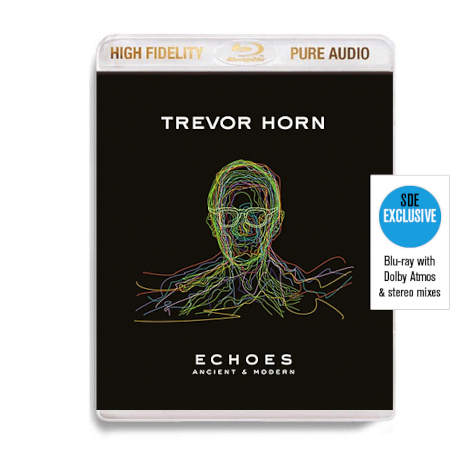
Echoes: Ancient & Modern Trevor Horn /
-
-
Dolby Atmos Mix, 5.1 Mix, 5.1 instrumental Mix, Hi-Res Stereo Mix
- Swimming Pools (Drank) feat. Tori Amos (Kendrick Lamar)
- Steppin’ Out feat. Seal (Joe Jackson)
- Owner Of A Lonely Heart feat. Rick Astley (Yes)
- Slave To The Rhythm feat. Lady Blackbird (Grace Jones)
- Love Is A Battlefield feat. Marc Almond (Pat Benatar)
- Personal Jesus feat. Iggy Pop
- Drive feat. Steve Hogarth (The Cars)
- Relax feat. Toyah Wilcox & Robert Fripp (Frankie Goes To Hollywood)
- White Wedding feat. Andrea Corr with Jack Lukeman (Billy Idol)
- Smells Like Teen Spirit feat. Jack Lukeman (Nirvana)
- Avalon (Roxy Music)
-

 Interview
Interview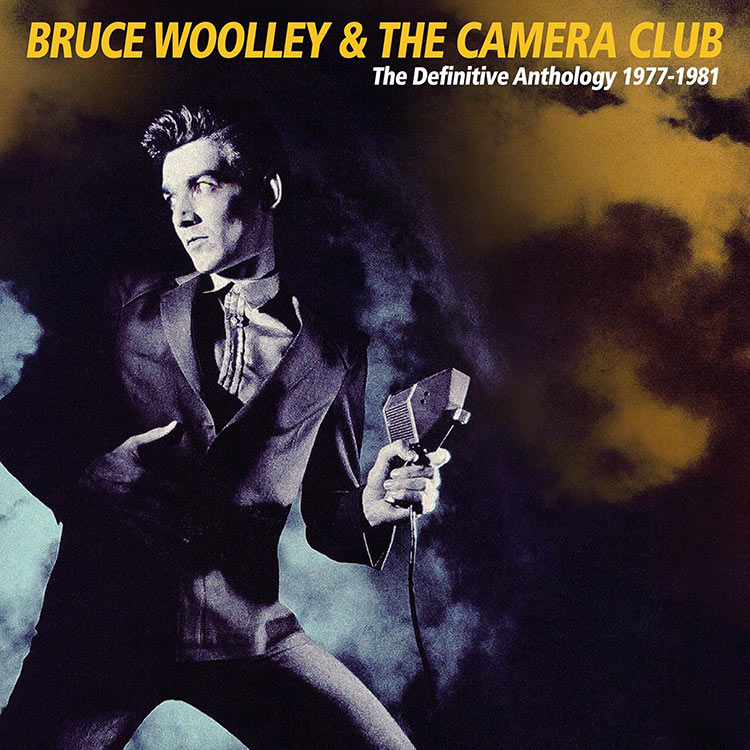

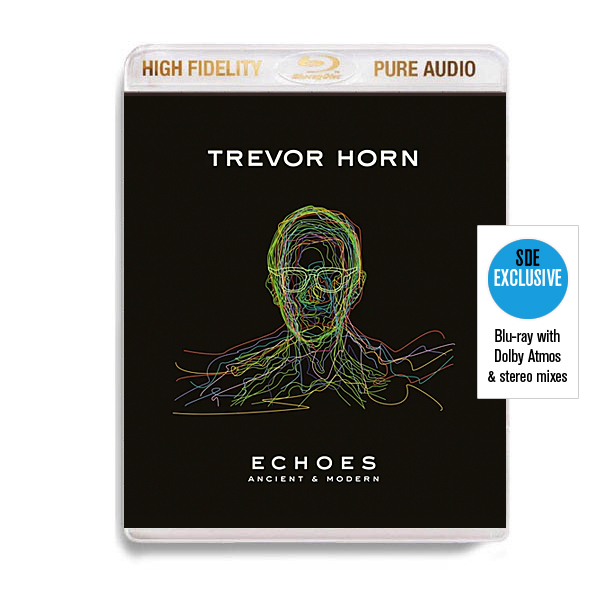
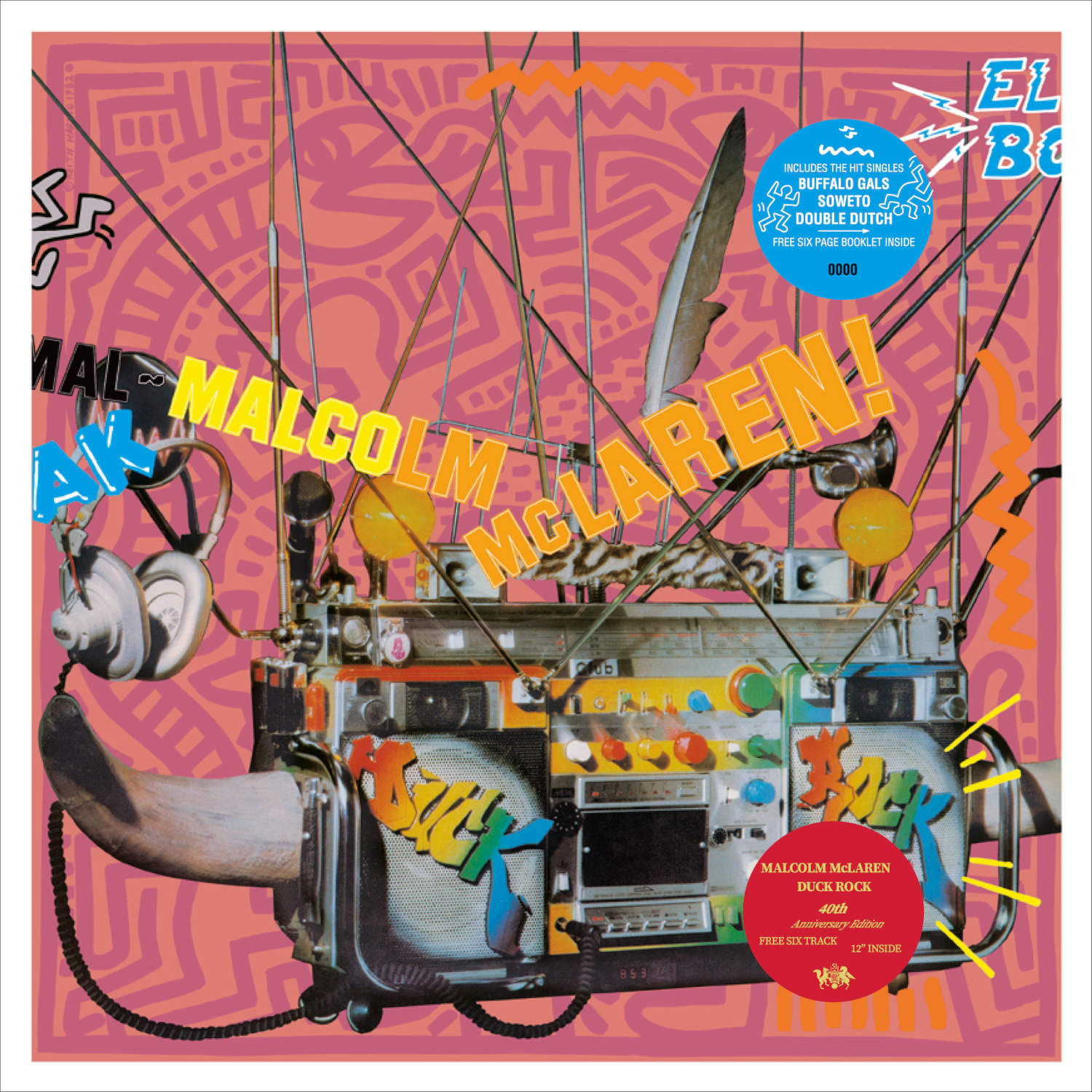
By Paul Sinclair
32